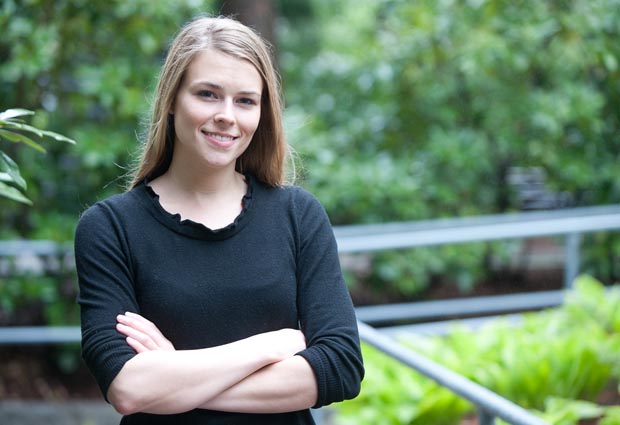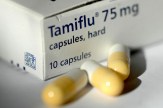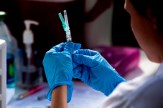Diving into chemistry

Krista Wager, who will graduate on Friday with both a bachelor’s and master’s degree in chemistry, has authored five research papers, including two review articles, over the last four years at Northeastern.
“I call it the dive-in approach,” she said of writing a review article. “You have to completely immerse yourself in the literature.” The result is a comprehensive and authoritative topic summary that scientists across the field can use to further their own investigations.
As a freshman, Wager was recruited into the lab of Chemistry and Chemical Biology Chair Graham Jones, who put her to work alongside graduate students to develop a series of novel molecules with potential applications in cancer therapeutics.
“These compounds acquire their ability to kill cells upon irradiation with UV light,” she said, explaining how the molecules can be used to selectively kill cancer cells but not their healthy neighbors.
After this first research experience, for which she was awarded a Merck Undergraduate Research Scholarship, Wager decided to further explore the biological applications of the compounds she was synthesizing.
During her third semester, Wager read nearly every article about a nuclear imaging technique called single photo emission computed tomography. The technique, she said, relies on radiation to provide images that track metabolism and biodistribution of investigational drugs at tissue, cellular and subcellular levels.
This work led to her first review article, which she wrote entirely on her own; it was published in the journal Current Radiopharmaceuticals in 2010.
On co-op, Wager conducted drug-discovery research that has the potential to make a global impact. At Millennium Pharmaceuticals in Cambridge, Mass., she performed hundreds of chemical reactions in an effort to identify new cancer drugs. At Merck Research Laboratories in Boston, she developed a more effective protocol for synthesizing a class of compounds typically used by medicinal chemists.
Jones praised Wager for both her research and lab work.
“Her appetite for laboratory work was evident,” he said, noting that he and Wager were recently asked to co-author a book that will explore organic chemistry as it applies to cancer research and drug discovery. “It has been a pleasure watching her grow into an independent research scientist over the years.”
“Her research,” he added, “exemplifies the essence of Northeastern — practical applications of use-inspired research.”
Wager’s fifth and final paper at Northeastern, her second review, focuses on biopharmaceuticals — medical drugs that are synthesized in living cells and present unique regulatory and manufacturing challenges.
After graduation, she will spend a year continuing her research with Merck before enrolling in medical school next fall.





